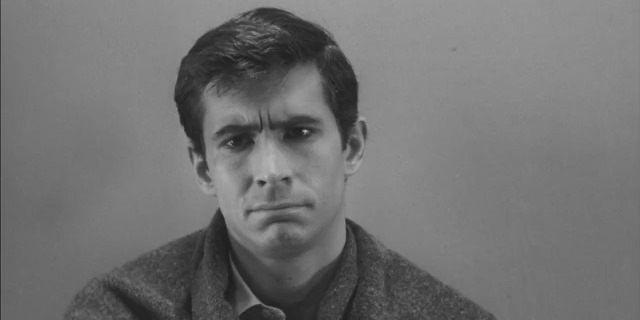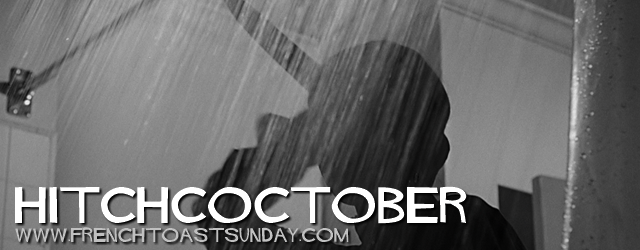
I’ve been spending a lot of time recently watching Hitchcock movies for HitchcOctober, and I’ve noticed Hitchcock loves a good villain. Well, so do I. Here’s a few of his best: Warning, spoilers.
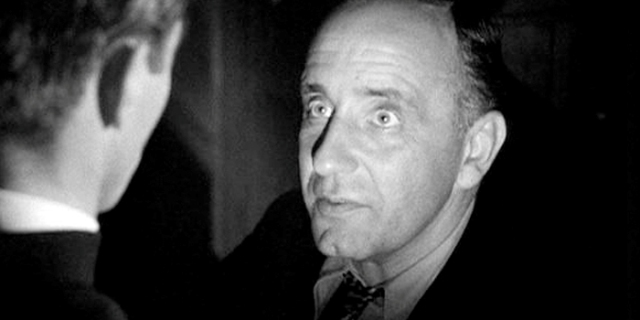
7. Otto Keller (I Confess): Otto Keller (O. E. Hasse) doesn’t begin I Confess as the villain. He’s just committed a murder in the spur of the moment and fled the scene, heading to the church where he works as a handiman, below which he lives with his wife. At the church, he bumps into Father Logan (Montgomery Clift) and, in the confessional, admits to his crime to cleanse his soul. So far he’s not exactly a hero, but he’s at least a sympathetic character – in the heat of the moment he made a rash decision and ran away from it; many of us can at least understand the scenario, even if we don’t condone his actions. His villainy occurs later, once Logan finds himself as the prime suspect for the murder, but cannot break the trust between himself and Keller and give up the real culprit. Keller makes the most of this situation, even being called in court as a witness, during which he incriminates Logan instead. Of all the characters on this list, Keller is the one who made me the most angry, as when we meet him it is clear Logan helped him and his wife in the past, getting them jobs to keep them afloat, but now Keller has revealed his true dastardly traits.
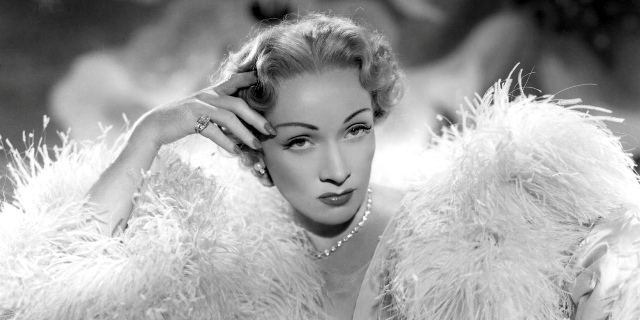
6. Charlotte Inwood (Stage Fright): I only watched Stage Fright for the first time last night, but I was so impressed by the character of Charlotte Inwood (Marlene Dietrich) that I just had to include her on this list. She is a complete and utter bitch. The film’s opening sees her appear at the doorway of her lover Johnny (Richard Todd) with a blood-stained dress and a story about murdering her husband. She convinces Johnny to head to the scene of the crime in order to stage a robbery and pick her up a clean dress, but when Charlotte’s maid sees him, Johnny finds himself in the frame and on the run for the murder. It later transpires that not all of this is entirely true, but everything we come to learn about Charlotte’s character is totally in keeping with her actions here. When she is supposed to be mourning her dead husband, she complains about the lack of colour in her funeral wear, and how it doesn’t accentuate her cleavage. She plays up to the detectives, putting on a real show under their questioning (in the film she is a famous actress, so she has a flair for theatricality), and even seems to profit from the news surrounding the murder, with her latest performance selling out to beyond capacity. Yet no matter how despicable Charlotte seems, she is still the most fun and watchable aspect of the film. You almost want her to get away with the scheme, if only we can see another film with her doing something else.
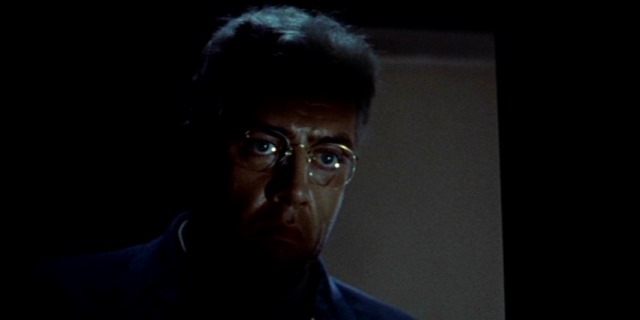
5. Lars Thorwald (Rear Window): Of all the villains on this list, Thorwald probably has the least screen time. He certainly has the fewest lines, with barely anything he says being audible until the last scene, yet he makes a great presence on the film, aided by his sizeable frame. He needs to look like a man who you could potentially believe killed his wife – James Stewart’s Jeff suspects this of having happened – and Raymond Burr captures this perfectly. I don’t think I’ve ever seen a more hateful glower of realisation when Thorwald discovers Jeff’s girlfriend Lisa (Grace Kelly) signalling to Jeff from Thorwald’s apartment. If anything, the threatening effect he has lessens once we actually get a conversation between him and Jeff, and his lumbering, Frankenstein’s monster-like gait at the climax doesn’t help either, but everything before that point is spot on.

4. Sir Humphrey Pengallan (Jamaica Inn): Charles Laughton is probably best known for playing The Hunchback of Notre Dame back in 1939, but that same year he also played the villain in Hitchcock’s Cornwall-set Jamaica Inn. His Sir Humphrey Pengallon is the local judge, who also happens to have a rather large finger buried deep inside a side-business of wrecking ships on Cornwall’s rocky coast, by means of his gang of hoodlums obscuring the warning lights during storms. As a villain, Pengallan is neither particularly threatening or effective, but he is terrifically fun. He’s a blustering, ruddy-cheeked fool, unable to accomplish anything without a brandy first, and if his butler decided to leave one day, one assumes Pengallan would be at an utter loss for how to even get up in the morning.
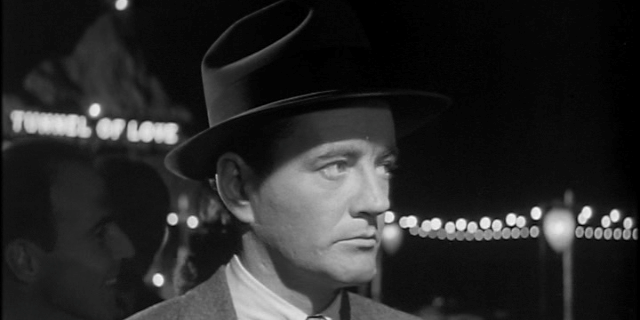
3. Bruno Antony (Strangers on a Train): Bruno Antony is perhaps the most dangerous entity on this list, in that it doesn’t take much to incur his schemes. All you really need to do is engage with him on a train, as is the case when Guy (Farley Granger) responds to Bruno’s questions one night. Bruno wants his overbearing father dead, and he happens to know that Guy, a famous tennis player, would be happier if his ex-wife were no longer around, so he can move on to the beautiful Ruth Roman. Bruno’s plan is simple, the pair of them should swap murders, as then there’d be no obvious motive, and they’d get off scot free. Understandably Guy doesn’t intend to go along with this mission, but then his ex-wife is killed, and Bruno suddenly turns up expecting his father to be the next body in the morgue and, when Guy doesn’t want to comply, Bruno begins to frame Guy for the murder instead. It isn’t just Bruno’s ability to destroy the lives of any innocent man that makes him a great villain, it’s Robert Walker, the actor behind the character who sadly passed away shortly after Strangers on a Train was released. He imbues Bruno with a flamboyant charm, making him obtrusive yet personable, sinister yet eager to help a blind man cross the street, despite the murder he is currently fleeing. And I’ll never quite forget the shot of Bruno sat in a sea of tennis fans, their heads all oscillating as they watch the ball, all except for Bruno’s whose gaze is locked unwavering from Guy.
2. Norman Bates (Psycho): As Hitchcock villains go, Norman Bates is probably the most famous, and for good reason, because the film’s key twists all revolve around him, and in terms of screen time and plot relevance it could be argued that he is actually the main character. It’s debatable as to whether Norman can actually be considered as the villain of Psycho, given that most of the villainous actions he undertakes are done under the guise of his mother, but they’re the same person, so hey have to be combined as a collective. Anthony Perkins is absolutely perfect as Bates, playing him as a too-squeaky-clean Boy Scout. When Janet Leigh’s Marion Crane first meets him he seems a little uneasy, a bit off, which is only to be expected when he spends all his time alone or with his mother and taxidermied birds, and suddenly this beautiful creature has entered his existence. Perkins’ performance is easily the best in the film – it was so good he ruined his own career, barely getting hired for anything else afterwards – but it really is a joy to behold. He’s creepy yet sympathetic, devoted to his mother yet resentful of her “existence,” and he is the reason I’ve never seen the Gus van Sant remake – I just can’t imagine Vince Vaughn capturing anything even close to Perkins. Genuinely the best part of 2012’s Hitchcock, however, is James D’Arcy as Anthony Perkins, who plays the actor as if he was Norman Bates. It doesn’t quite make sense, but it’s a nice touch to an otherwise unremarkable film.
1. Mrs. Danvers (Rebecca): Rebecca is another movie I only saw for the first time this month, mainly at the behest of fellow French Toastie Jess, who ranks this amongst her favourite movies. Mrs. Danvers (Judith Anderson) is the head housekeeper at Manderlay, the stately Cornwall home of the de Winters (Laurence Olivier and Joan Fontaine), but whose devotion to Rebecca, the first and now late Mrs. de Winter, sees her instinctively despise anyone who believes they can replace her. Danvers’ hatred of the new Mrs. de Winter (who is never named anything other than the second Mrs de Winter, because she didn’t matter before she married Maxim) takes her to extreme measures, even trying to convince the new bride to kill herself, before eventually burning Manderlay down, because if Rebecca can’t have it, neither can anyone else. Danvers could really share this position with a very similar character from a later Hitchcock movie, Milly the maid (Margaret Leighton) in Under Capricorn, whose villainy sees her keeping her mistress Henrietta (Ingrid Bergman) in an alcoholic stupor for years, and creeping the bejeezus out of her (and me) with a demonic shrunken head, but her motives are a little murky, and her performance isn’t as good as Anderson’s. The great thing about Danvers, and what makers her really scary, is she keeps up the old tradition that serving staff are rarely seen in motion. She’s always just kind of there, standing in the background, as omnipresent as the memory of her former mistress, arms folded and with a look of disapproval and mild amusement on her face.


